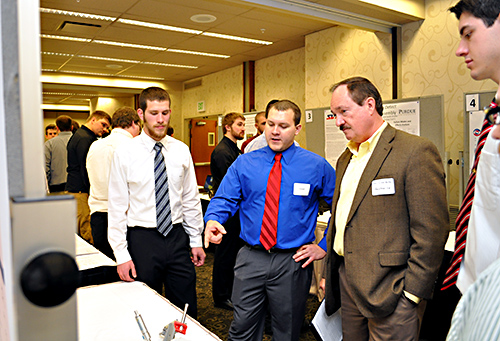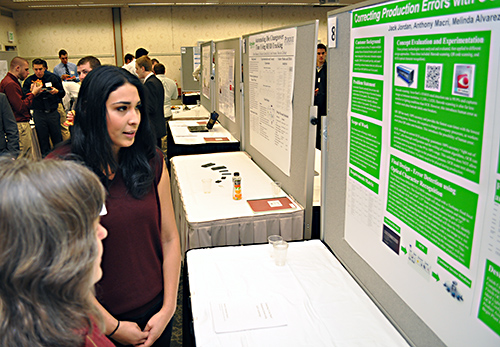 Thirty-three teams of engineering technology seniors completed a yearlong industry-sponsored capstone course during finals week with a public poster session highlighting their projects. In nearly all cases, the projects asked students to improve a process to increase safety, efficiency or automation for a customer.
Thirty-three teams of engineering technology seniors completed a yearlong industry-sponsored capstone course during finals week with a public poster session highlighting their projects. In nearly all cases, the projects asked students to improve a process to increase safety, efficiency or automation for a customer.
One team, for example, worked on a sensor and transmitter that can be used to track wear and tear of a knee joint implant. Another team helped automate the kitting process for a manufacturer with the help of a Baxter robot. Two other teams collaborated with students in Europe on projects for Lenze and Eaton.
The feedback from their sponsors and mentors has been positive. Several student solutions have been adopted by sponsors in their company’s everyday operations. In addition, student team members have been able to discuss their projects during job interviews, providing them additional marketable skills to highlight.
The senior course for School of Engineering Technology students is led by Phil Sanger, professor of electrical engineering technology. It has grown from three projects in its first year to 33 in its current and third year. As part of its transformation as part of one of the Purdue Moves initiatives, the college plans to create similar experiences for seniors in its other departments, and they will look to Sanger’s success as a model for implementation.
“The tasks they are achieving are ones that they couldn’t get from a traditional classroom experience,” Sanger said. In the process of gaining valuable project and team experience, the students help companies find solutions that can impact consumers as well as the bottom line
Global reach
Even before the classes began, students had to apply to be part of the two international teams. Four students were chosen to work with their counterparts from the University of Hanover in Germany. Three others worked with students from Gdansk University of Technology in Poland.
“How do we change people’s mindsets about going global?” Sanger asked. “These projects require students on both sides of the ocean to work together and figure out how to work with someone from another country or culture.”

Additional space
Because of the size of the capstone course – 118 students – the college needed to locate additional space where students could design, build and test their projects. They found that space at Purdue Research Park in West Lafayette. In addition to workspace, the students had access to conference rooms for consultations with their industry sponsors. Their space also included 10 computer stations, 24 work stations and 18 rolling tool cabinets.
